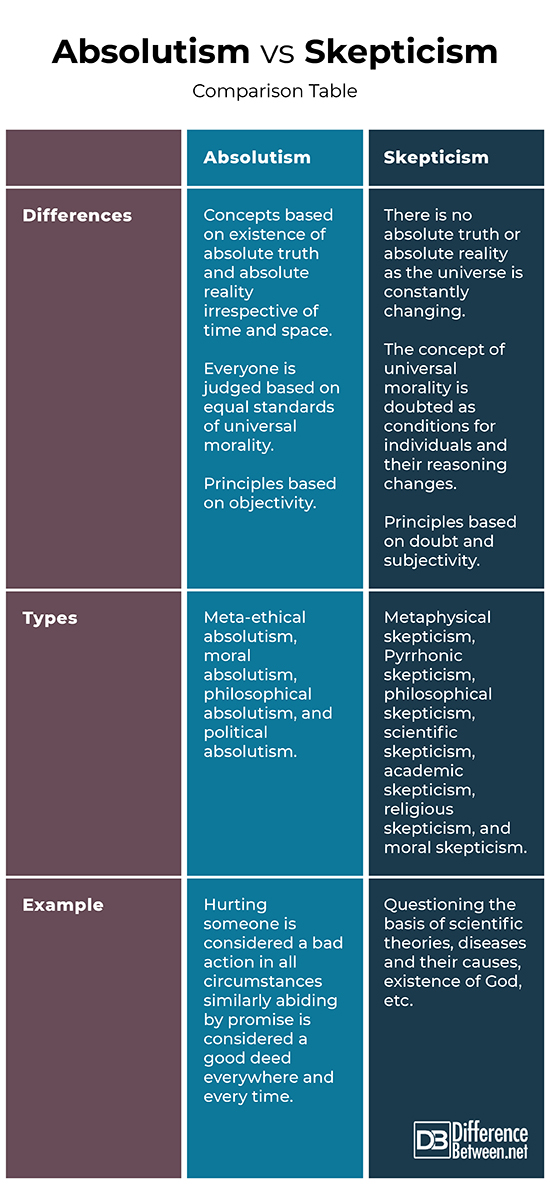Difference Between Absolutism and Scepticism
What is Absolutism?
Definition:
Absolutism is a concept used by contemporary philosophers. As there were no defined boundaries between philosophy and political science, so this term also had its roots both in Politics and Philosophy. Considering the philosophical perspective, Absolutism is defined from the metaphysical lens as the reality that transcends human knowledge hence creating an absolute reality (Kelsen 906).
Characteristics of Absolutism:
Some of the characteristics of Absolutism and absolute reality are given below:
• The absolute reality is independent of the bounds of time and space.
• Absolute reality as explained by absolutism provides the basis for objective knowledge unattainable by the human mind.
• Philosophical absolutism can be categorized as epistemological totalitarianism (Kelsen 909).
• Philosophical absolutism considers the inequality of the subjects in relation to absolute and supreme beings more fundamental than their equality (Kelsen 908).
• “Absolutism corresponds to the possibility of absolute truth and absolute values” (Kelsen 906).
• Perfection is one of the characteristics of absolutism. It implies that a certain thing can be valid or true in all situations in every time and in every place regardless of circumstances.
• It sets absolute standards of values and morals that are objective and in no way can be altered.
Examples for Absolutism:
One of the prominent examples of absolutism is Kantian ethics. According to Immanuel Kant, certain actions are always right, and certain actions are always wrong regardless of the circumstances and these are judged according to the universal morals or ethics. These universal morals or ethics are those actions that are considered beneficial for all human beings universally in all times and in all places. Absolutism renders telling a lie unethical in all situations.
So What is Skepticism?
Definition:
The term skepticism or scepticism was derived from the Greek word “skeptikos” meaning “the inquirer”. Skepticism is defined as doubting and questioning of all claims, knowledge, truths, and principles not to render them false but to challenge their adequacy and authenticity (Popkin 1).
Characteristics:
Following are some characteristics that skeptics consider while bringing forth the claims of skepticism:
• There is no absolute certainty or absolute uncertainty rather imperfect certainty and absolute certainty both are questioned.
• There is no absolute truth or absolute lie.
• Morality, ethics, and values are questioned on rational grounds.
• The Reason is not linked to isolated certainties rather is mutual and organic (Sheldon 623).
• Absolute knowledge is unattainable. Some skeptics also challenge the existence of knowledge and absolute reality (Sheldon 625).
Examples for Skepticism:
One of the simplest examples of skepticism is doubting the existence of religion, God or the presence of supreme authority. Another example can be of suspecting any scientific theory or claim to be true.
Similarities Between Absolutism and Skepticism:
Absolutism and skepticism are two different concepts that are in no way similar to one another. One cannot draw any parallel between the two concepts except that both the concepts are of fundamental importance for shaping the society, societal norms and ethics and most importantly formed the foundation of more theories and philosophical concepts such as relativism, consequentialism, imperialism, etc.
Difference Between Absolutism and Skepticism:
Epistemology:
Epistemologically, skepticism challenges the existence of knowledge while absolutism accounts for the existence of true knowledge. According to the epistemological view of absolutism, the theory of knowledge (a priori) can be judged in just two ways it can either be true or false leaving out any other probability (Oppenheim 953).
Existence of truth:
Absolutists claim the existence of absolute truth irrespective of the conditions and circumstances of a person on the other hand skeptics questions the existence of absolute truth. According to skepticism, the universe is undergoing change every second and no one can develop permanent and unchangeable truth for it.
Value judgments:
In absolutism, value judgments are always exactly the same for every subject, unlike skepticism where value judgments are not the same for every subject.
Objectivity:
In Absolutism, every action is judged according to absolute standards that are highly objective and leaves no room for subjectivity and interpretation based on the situation. On the contrary, skepticism allows interpretation of certain actions based on the circumstances and is somewhat subjective however, it questions the actions and suspects the position of individual to seek actual truth.
Justice:
Some philosophers are of the view that absolutism leads to justice and order in society as law or universal moral ethics are the same for everyone. Any person that deviates from these rules is subjected to an outlandish behavior or is persecuted according to law. But skepticism is not rigid and sometimes provide a subjective approach to Justice.
Types:
Meta-ethical absolutism, philosophical absolutism, moral absolutism, and political absolutism are some types of absolutism while types of skepticism are philosophical skepticism, Pyrrhonic skepticism, moral skepticism, religious skepticism, and metaphysical skepticism.
Contributors:
Absolutism is a relatively old concept found in the philosophies of Plato, Aristotle and later in the theories of Kant while the concept of skepticism challenged the theories proposed by these philosophers. Pyrrho of Elis, Socrates, Carneades, and Arcesilaus are the prominent names in the history of skepticism.
Absolutism Vs Skepticism: Comparison Table
Summary:
It is concluded that absolutism and skepticism both are the concepts of philosophy and differ from each other in many ways. Both go antiparallel to each other based on an absolute belief in the case of absolutism and doubt and disbelief in case of skepticism. One accounts for objectivity while other accounts for subjectivity. However, both the concept has fundamental importance in the field of philosophy.
- Difference Between Court of Law and Court of Justice - August 10, 2019
- Difference Between Labor Day and Memorial Day - July 28, 2019
- Difference Between Whistleblower and Leaker - July 27, 2019
Search DifferenceBetween.net :
Leave a Response
References :
[0]Kelsen, Hans. “Absolutism and Relativism in Philosophy and Politics.” The American Political Science Review, vol. 42, no. 5, 1948, pp. 906–914. JSTOR, www.jstor.org/stable/1950135.
[1]Oppenheim, Felix. “Relativism, Absolutism, and Democracy.” The American Political Science Review, vol. 44, no. 4, 1950, pp. 951–960. JSTOR, www.jstor.org/stable/1951296.
[2]Popkin, Richard H. “Skepticism.” Encyclopædia Britannica, Encyclopædia Britannica, Inc., 12 June 2017, www.britannica.com/topic/skepticism.
[3]Sheldon, W. H. “Scepticism.” The Journal of Philosophy, vol. 31, no. 23, 1934, pp. 617–633. JSTOR, www.jstor.org/stable/2015835.
[4]Image credit: https://en.wikipedia.org/wiki/Cynicism_(philosophy)#/media/File:Jean-L%C3%A9on_G%C3%A9r%C3%B4me_-_Diogenes_-_Walters_37131.jpg
[5]Image credit: https://en.wikipedia.org/wiki/Political_philosophy#/media/File:Sanzio_01_Plato_Aristotle.jpg



